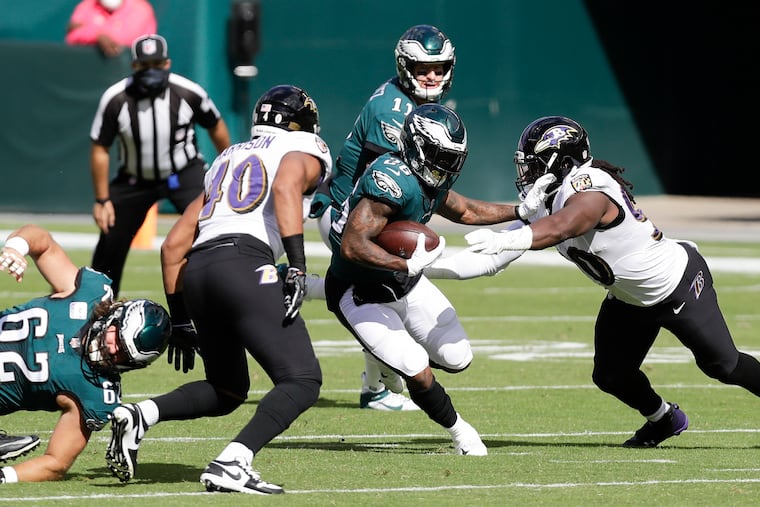A maximum Miles Sanders should help Carson Wentz and the Eagles | Jeff McLane
The Eagles know Sanders is capable of more than he's shown. So does he, especially now that he’s healthy and ready for the final stretch. “I feel back to normal, back to myself,” he said.

In Weeks 2-6, Miles Sanders rushed for 434 yards and three touchdowns, caught 12 passes for 91 yards, and was the only NFL player to have two 70-yard-plus runs.
The numbers were impressive, if not the Eagles' results, but something about the running back’s usage and production during that period felt incomplete.
The Eagles had touted Sanders as their budding bell cow heading into the season, and yet his average touches weren’t any higher than they were last season, when he became the No. 1 back.
There were various reasons for his underuse. The Eagles trailed in most of those games, and thus had to throw more to catch up. But Sanders had missed the opener because of a hamstring strain, and fatigue was cited several times when questions about his handling arose.
Coach Doug Pederson and assistant Duce Staley didn’t want to set back their running back knowing that he would be needed for the long haul. But it wasn’t overuse, ultimately, that sidelined Sanders again. It was a freak knee strain at the end of his 74-yard run against the Ravens.
“It was definitely frustrating,” Sanders said Friday of having multiple injuries this year. “I would be lying if it wasn’t.”
Sanders returns Sunday against the New York Giants after a two-game layoff. Boston Scott did fine in his place, but if the Eagles are to have game-breaking ability, and the kind of consistent support on the ground they need to ease some of the burden on quarterback Carson Wentz, they need Sanders at full strength for the second half.
He has avoided significant injury in the NFL, but the second-year tailback has also already had his share of bumps and bruises. He strained his hamstring not long after the Eagles drafted him. And while he played in all 16 games as a rookie, a late-season ankle sprain meant that he was at less than 100 percent in the playoffs.
Such is life in the NFL. But Sanders knows that running backs have only so many miles and so many opportunities to earn a franchise-level second contract. Asked if there was any benefit to watching from the sidelines, Sanders said there is no substitute for playing and learning.
He’s been everything and more than the Eagles had hoped for when they selected him in the second round. The necessary agility, speed, and toughness were evident from Day 1. But Sanders' work ethic, attention to detail, and lack of pretense give him another edge.
“When I was a rookie, you can’t get too big-headed or worry about the round you went in,” Sanders said when he was asked about rookie receiver Jalen Reagor. “Yeah, they brought you here for a reason, but you got to also prove it to these guys on the team and throughout the league.”
Expectations were high after he collected a rookie-high 1,327 yards from scrimmage last season. The Eagles opted not to add a veteran in the offseason, and rather than talk up his preference for running-back-by-committee, as he’d done previously, Pederson declared Sanders his workhorse.
Sanders had 20 carries and three catches with the Rams in his first game back. But his touches decreased with each game, from 23 to 22, 15, 13, and 10. But over that span only the Titans' Derek Henry (547) and the Vikings' Dalvin Cook (439) had more rushing yards, and they averaged 8.2 and 5.8 more carries per game, respectively.
Sanders said that he didn’t expect to be held back upon his reemergence. Pederson seemed to imply the same Friday.
“We have to monitor him,” the coach said. “We got to make sure that we don’t see the signs of fatigue with him, but we haven’t seen any this week in practice.”
There was obvious rust in his first game back. Sanders fumbled on his second tote and he unnecessarily bumped a run outside – an early rookie bad habit – a series later. But his rushes from that point have mostly been definitive.
» READ MORE: Reason for optimism (and pessimism) for Carson Wentz in the season’s second half
Sanders' two 74-yard bolts – the first a touchdown at the Steelers, the second he coughed up before Eagles receiver J.J. Arcega-Whiteside retrieved the ball in the end zone – have given him the highest percentage of “breakaway yards” out of 55 qualifying running backs.
But he’s also done well closer to the line, with an average of 3.44 yards after contact, 10th in the league.
Sanders hasn’t been as effective as a receiver, which clearly wasn’t the plan. Most of the struggles haven’t been his fault. The screen game has been nearly nonexistent. But he’s also had two drops, one a perfect Wentz floater he dropped in the end zone.
» READ MORE: Could Eagles cornerback Michael Jacquet be the next practice-squad promotion to stick?
The Eagles know Sanders is capable of more. So does he, especially now that he’s healthy and ready for the final stretch.
“I feel back to normal, back to myself,” Sanders said. “I’m ready to get out there and stack these wins up.”
A maximum Sanders should help.